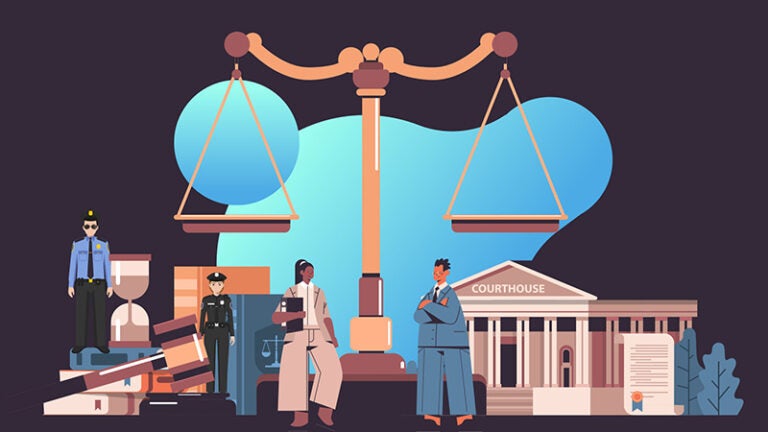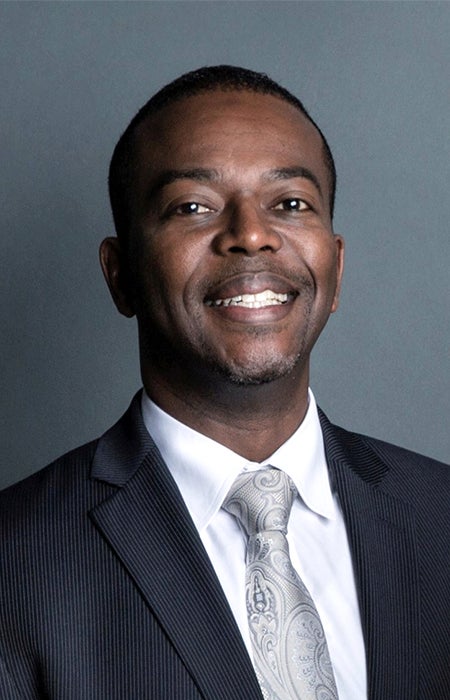
USC Dornsife’s Olu Orange joins new panel reexamining fatal police incidents
In the wake of numerous high-profile, fatal incidents involving Los Angeles police officers, L.A. County District Attorney George Gascón recently formed an independent panel to take a deeper look at the circumstances surrounding officer-involved fatalities.
The Factual Analysis Citizen Consulting Team (FACCT), composed of civil rights attorneys, scholars, activists and constitutional police practices experts, will identify, prioritize and review use-of-force cases to determine whether they should be recommended for prosecution.
Among FACCT’s 16 members is Olu Orange, director of the Trial Advocacy Program and Agents of Change Civil Rights Advocacy Initiative at the USC Dornsife College of Letters, Arts and Sciences. He and other appointees to FACCT will review cases in which there is contrary forensic evidence or witness testimony, evidence from a civil or criminal case or impeachment evidence.
Orange seized his appointment as an opportunity for USC students to participate in and learn from the panel’s work by helping to gather and review additional evidence.
Here the accomplished civil rights lawyer and adjunct assistant professor of political science at USC Dornsife explains how he got involved in FACCT, how the independent panel will work, what he hopes it will achieve and how the opportunities it offers will benefit USC students.
How did you get involved in this initiative?

Olu Orange serves on the Factual Analysis Citizen Consulting Team. (Photo: Courtesy of Olu Orange.)
Civil rights attorney Je Yon Jung, a former senior trial attorney for the Civil Rights Division, U.S. Department of Justice and Consumer Financial Protection Bureau, invited me to be on the panel and to help identify and recruit other members.
Gascón created FACCT as part of making good on his promise to reverse former DA [Jackie] Lacey’s practice of declining to prosecute police killings. The case of Mohammed Usman Chaudhry — a young man with autism shot and killed by police in 2008 — was one of those that she declined, even though a jury found that the officer acted with malice in the killing. Six years after Chaudhry’s death, the Ninth Circuit Court of Appeals ruled that Chaudhry’s family were entitled to damages resulting from the violation of his civil rights, overturning a previous ruling and setting a precedent.
This happened thanks to years of work by students from the USC Dornsife Trial Advocacy Program who fought for justice for Chaudhry’s family. Among them was the late USC Dornsife student Jack Harding. The Dornsife Trial Advocacy students working with FACCT are supported by the Chaudhry and Harding family endowments.
What type of cases will you reexamine?
We’re mainly looking at shooting incidents, but we’re also looking at other types of police-involved fatalities like tasers, restraint and asphyxiation.
How will you review each case?
We’re looking at all publicly available evidence and information. That might include reviews, inquiries, news stories, witness statements and video recordings from community members.
As we’re entirely independent and are not agents or employees of L.A. County, we can’t look at any confidential or protected evidence or information, we can only look at what is in the public sphere. However, better laws have been passed recently to obtain disclosure of police misconduct and information regarding force likely to cause great bodily injury or death, and dishonesty regarding officer conduct.
In reviewing that material, we’re looking at three different areas: police practices and procedures, legal issues, and assessment of the nature and level of community involvement.
If you find that there is a good case for prosecution, what happens next?
We will present our findings to the district attorney’s office, which will ultimately decide whether additional investigation is necessary, if the matter should be assigned to a special prosecutor or if criminal charges are filed.
How can USC students be involved and why is it beneficial for them?
Under significant supervision and guidance, USC students will assist us with every aspect of our review, including communicating with sources, reviewing information and discussing findings.
It’s very important for the next generation — who will have to make legal and political decisions about police accountability and holding the government responsible for killing the people they’re supposed to serve — to be involved in that process, understand how it works and understand, most importantly, that such a process must exist.
I’m hoping they will acquire an affinity for communicating with members of the community and an appreciation for those who have suffered and the necessity of advocating for and bringing those concerns to the ears of officials who can take action.
What do you hope this program achieves and why is it so important?
For decades, it has been the case that there was police exceptionalism with some police officers operating above the law. I hope that the results of this panel and its work are twofold: first, that police officers who deserve to be are prosecuted and held accountable for their misconduct; and second, that the public understanding becomes that police officers are not above the law and must regularly be held accountable for the same things for which everybody else is held accountable.
I’m not alone in this. I know police officers, and they don’t like the fact that their colleagues who do bad things are not held accountable because it makes it harder for them to do their jobs. And they’re trying to do them right.
Now, with this panel, there is accountability. Hopefully, its impact will cause a reduction or elimination of these fatal use of force incidents and help to restore faith in our justice system.